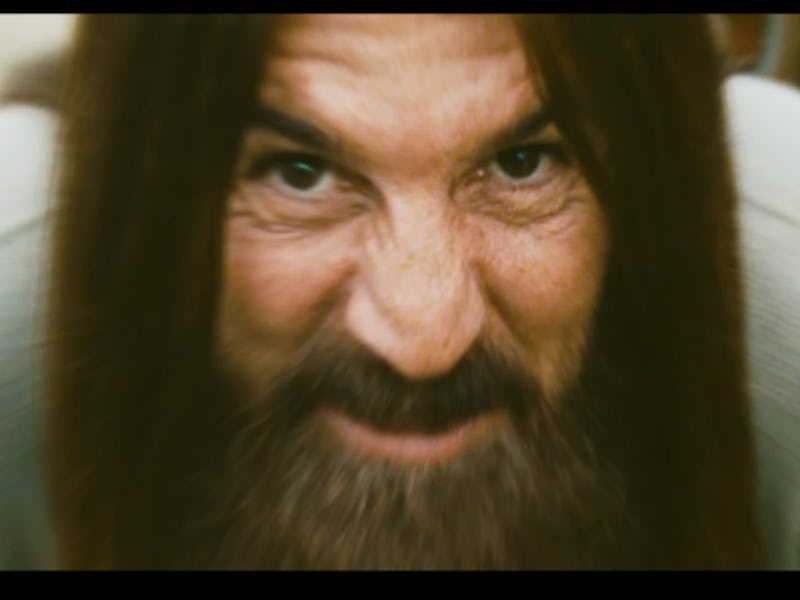Bob From David Lynch's 'Twin Peaks' Showed Up in 'True Detective'
More Lynch-play from Pizzolatto and his squad.

If there were hints of David Lynch-like creepout and suspense tactics in the acclaimed first season of HBO’s True Detective, the show’s generally disparaged second season embraces them fully. It also integrates what would seem to be direct references to specific Lynch moments, and plenty of them. We’ve touched on this before, but by this point the Lynch nods have become central to the show’s entire affect.
First, there was the singer-songwriter (Lera Lynn) in the dive where Ray (Colin Farrell) and Frank (Vince Vaughn) frequently meet to talk cryptic business. She functions like the ethereal Julee Cruise singing at the Roadhouse in Twin Peaks. Then there is the dreamlike Conway Twitty impersonator who lip-syncs as Ray dances toward the pearly gates after taking shotgun slugs to the chest. Down to the eerie light and makeup, the segment recalls Blue Velvet’s musical M.O., particularly the karaoke version of Roy Orbison’s “In Dreams” sung by Ben (Dean Stockwell) in his seedy apartment:
Then there’s the bungalow where Ray gets shot by the bird-masked man, with its overtones of Jacques Renault’s sexpad/cabin hideaway in Twin Peaks, and the frequent haunting, through-the-windshield shots dominated by yellow dotted road lines, which recall the opening sequences of both Lynch’s Lost Highway and Mulholland Drive (vehicles climbing those craggy, California hills). Perhaps it all comes with the “weird California” territory.
Pizzolatto claimed emphatically early on that there would be no overt references in TD’s second season, to preempt any further possible accusations of plagiarism (these haunted him during Season 1). Perhaps he was just referring to direct textual inspiration, since he and his crew of directors have seemingly piled on tenfold the amount of visual homages.
Last night’s episode, perhaps, was the coup de grâce of this season’s Lynch love affair. The next in a rapidly expanding line of True Detective Big Closing Sequences took place at one of the infamous “private parties” we’ve been hearing so much about. Ani Bezzerides (Rachel MacAdams) infilterates it, masquerading as one of the crowd of high-end prostitutes. After being forced to take MDMA as a Binaca-like mouthspray, Bezzerides’ vision becomes blurred, and sounds stylized and slowed; the orgy around her, in turn, ramps up into a frenzied conflagration of blurry bodies. The hazy, squalid scene sharply recalls the visual approach Lynch takes in the “Pink Room” scene in his Twin Peaks followup film Fire Walk With Me.
But then, there was the watershed moment: A hallucinatory figure pops in unexpectedly during Ani’s bad molly jaunt. He’s a long-haired, ghoulishly grinning phantom who resembles and serves the same essential purpose as the infamous “Bob” from Twin Peaks. In that show and in TD, the grinning man is an embodiment of evil and sexual violation, a grim spirit that devours both Laura Palmer and Bezzerides. In Ani’s case, this is the harbinger of evil that makes her who she is — presumably, a member of her father’s former commune who assaulted her as a young girl — rather than an unreal dark force that inhabits her, as it is for Laura and Leland Palmer in Lynch’s saga. Though Ani’s ghost is real — not a spirit apropos of nothing — the likeness is unmistakable and almost comical. (Incidentally, did we need double rape backstories on this show?)
"Bob"
Everyone loves Lynch, True Detective; we get it. But also, a hell of a lot of people have seen his stuff — a lot more than have read The King in Yellow. Moments that tip the cap this blatantly distract and prevent one from taking True Detective seriously, which — as many have remarked — is a big problem for the show this season.
TD's Longhair